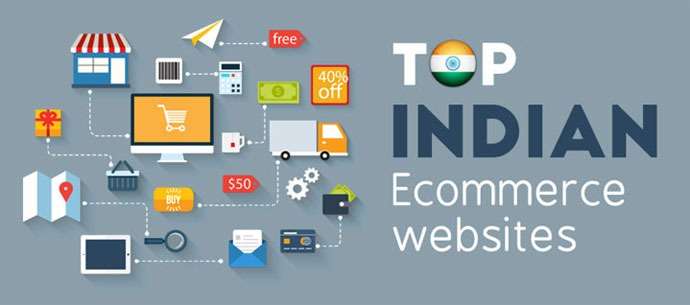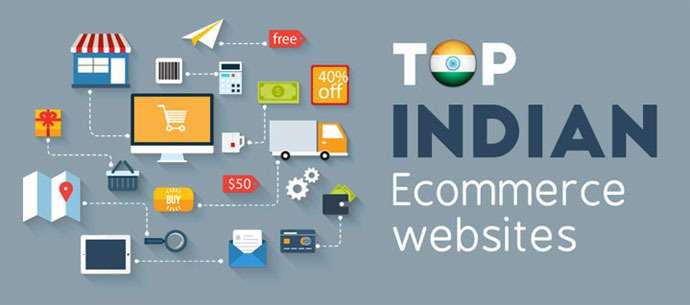Top 10 e-commerce companies in India

May 12, 2024
Top 10 e-commerce companies in India
Discover the top 10 e-commerce companies in India and gain insights into the most popular online retailers operating in the country. This list showcases the leading players in India's booming online retail market, from household names to up-and-coming startups. Stay ahead of the competition with our comprehensive guide.
In today's digital age, e-commerce has become a major player in the Indian market. With the increasing popularity of online shopping, several companies have emerged to cater to the growing demand. From household goods to fashion and electronics, these e-commerce platforms offer a wide range of products at the convenience of a click. In this blog post, we will take a closer look at India's top 10 e-commerce companies, their unique features, and how they have revolutionized the way Indians shop. So let's dive in and explore the leading players in the Indian e-commerce industry!
In recent years, e-commerce has seen tremendous growth in India, with more and more people turning to online shopping for their convenience and ease. The emergence of e-commerce has revolutionized the way Indians shop, making it possible to purchase everything from groceries to big-ticket items with just a few clicks. This has led to the rise of various e-commerce companies in the country, each offering a unique range of products and services. In this blog post, we will take a look at the top 10 e-commerce companies in India.
1. Flipkart
Founded in 2007, Flipkart is one of the pioneers of e-commerce in India. It offers a wide range of products, including electronics, fashion, home appliances, and more. In 2018, Flipkart was acquired by Walmart, making it one of the largest e-commerce companies in the country.
2. Amazon India

Amazon, the global e-commerce giant, entered the Indian market in 2013 and has since become a major player. It offers a vast selection of products, competitive pricing, and fast delivery services. Amazon India also has its streaming service, Prime Video, and offers other services like Amazon Pay and Prime Music.
3. Paytm Mall
Paytm Mall is the e-commerce arm of Paytm, a digital payment platform. Launched in 2017, it offers a variety of products, including electronics, fashion, home and kitchen, and more. It has also introduced a cashback feature, where users can earn cashback on every purchase.
4. Snapdeal
Snapdeal is another prominent player in the Indian e-commerce market, offering a wide range of products at competitive prices. It also has its own logistics service to ensure fast and efficient delivery. In addition, Snapdeal has recently launched a program called "Snapdeal Plus" to help small and medium-sized businesses sell on its platform.
5. Myntra
Starting as an online fashion store in 2007, Myntra has become one of India's leading fashion e-commerce platforms. It offers a vast collection of clothing, footwear, and accessories from top brands. Myntra was acquired by Flipkart in 2014.
6. Tata CLiQ
Tata CLiQ is the e-commerce arm of Tata Group, one of the largest conglomerates in India. It offers a wide range of products, including electronics, fashion, home appliances, and more. Tata CLiQ also has a unique concept of "phygital" stores, where customers can experience products before making a purchase online.
7. Shopclues
Shopclues is a popular e-commerce platform that offers a wide range of products, including fashion, electronics, home and kitchen, and more. It also provides a hassle-free return and refund policy, making it a reliable choice for buyers.
8. Ajio
Ajio is a fashion e-commerce platform launched by Reliance Industries in 2016. It offers a curated collection of trendy and affordable clothing, footwear, and accessories for men and women. Ajio also has its private label and a loyalty program, making it a popular choice among fashion enthusiasts.
9. Nykaa
Nykaa is a one-stop destination for all things beauty, offering a wide range of cosmetics, skincare, hair care, and wellness products. It has also ventured into the fashion category with the launch of Nykaa Fashion, making it a popular choice among women.
10. FirstCry
FirstCry is a leading e-commerce platform for baby and kids' products. It offers a wide range of products, including clothing, toys, accessories, and more. It also has its brand, BabyHug, and a loyalty program for its customers.
In conclusion, the e-commerce industry in India is rapidly growing, and these top 10 companies have contributed significantly to its success. With the increasing adoption of technology and the rise in digital payments, the future of e-commerce in India looks promising. As more and more people turn to online shopping for their daily needs, we can expect to see more players entering the market and the existing ones expanding their offerings to cater to the diverse needs of Indian consumers.
E-commerce business advantages and disadvantages
E-commerce, or electronic commerce, has revolutionized the way we do business and has become an integral part of our daily lives. It entails buying and selling of goods and services over the Internet, eliminating the need for physical stores or face-to-face transactions. With the rise of technology and the internet, e-commerce has become increasingly popular and has its own set of advantages and disadvantages.
Let's take a look at some of the major advantages of e-commerce businesses:
1. Global Reach: Unlike traditional brick-and-mortar businesses, e-commerce allows companies to reach a global market. With just a click of a button, businesses can expand their reach and sell their products or services to customers all over the world. This opens up a massive potential customer base, increasing sales and revenue.
2. 24/7 Availability: E-commerce businesses are open 24 hours a day, 7 days a week. This means customers can shop at their convenience, any time of the day or night. This not only increases sales but also improves customer satisfaction and loyalty.
3. Cost-effective: E-commerce businesses do not require a physical store, which eliminates the cost of rent, utilities, and other expenses associated with a traditional storefront. This makes it a cost-effective option for both businesses and customers, resulting in lower prices for products and services.
4. Easy to set up and operate: Setting up an e-commerce business is relatively easy and does not require a large investment. With the availability of e-commerce platforms and website builders, businesses can create an online presence in a short period. This makes it an attractive option for entrepreneurs and small businesses.
5. Quick and convenient: E-commerce businesses provide a fast and convenient shopping experience for customers. With just a few clicks, customers can browse through a wide range of products, compare prices, and make purchases, all from the comfort of their own homes. This saves time and effort, making it a popular choice among busy individuals.
However, like everything else, e-commerce also has its drawbacks:
1. Lack of Personal Interaction: One of the main disadvantages of e-commerce is the absence of in-person interaction with customers. This can make it difficult to build trust and establish a strong relationship with customers, leading to lower customer loyalty.
2. Security Concerns: With the rise of online shopping, there has also been an increase in cybercrime. Customers may be hesitant to provide their personal and financial information online, which can hinder their willingness to make purchases.

3. Dependence on Technology: E-commerce businesses heavily rely on technology, and any technical issues or glitches can disrupt the entire operation, leading to lost sales and revenue.
4. High Competition: With the low barrier to entry, e-commerce businesses face stiff competition. This makes it challenging for new businesses to establish their presence and attract customers.
5. Shipping and Logistics: Shipping and logistics can be a major challenge for e-commerce businesses. With the expectation of fast and reliable delivery, businesses must have a well-established and efficient system in place to fulfill orders and meet customer expectations.
In conclusion, e-commerce offers numerous benefits, such as a global reach, 24/7 availability, cost-effectiveness, and ease of operation. However, it also has its drawbacks, such as lack of personal interaction, security concerns, and high competition. To succeed in the e-commerce industry, businesses must carefully consider these advantages and disadvantages and develop strategies to overcome any challenges. With the increasing popularity of online shopping, it is safe to say that e-commerce is here to stay and will continue to shape the way we do business in the future.




